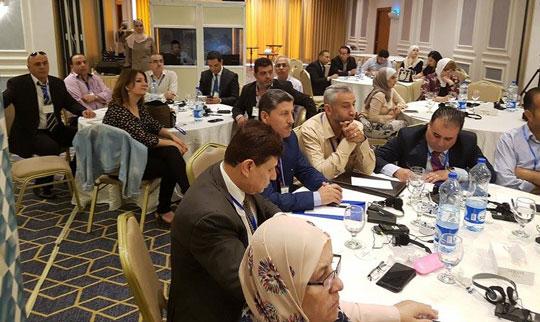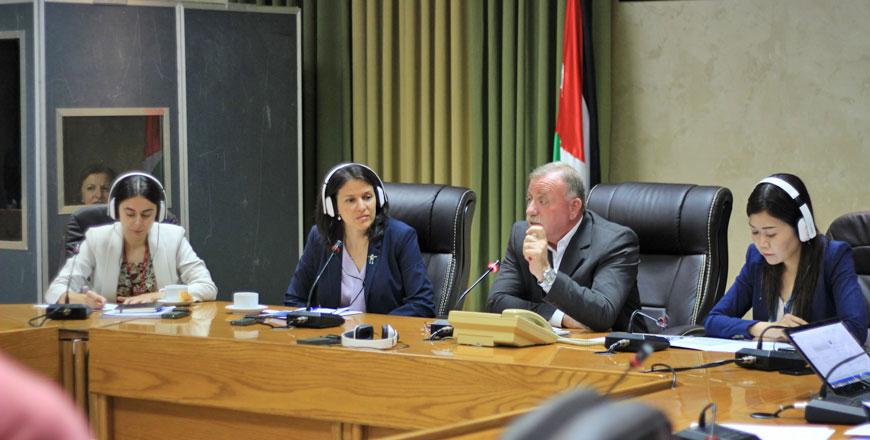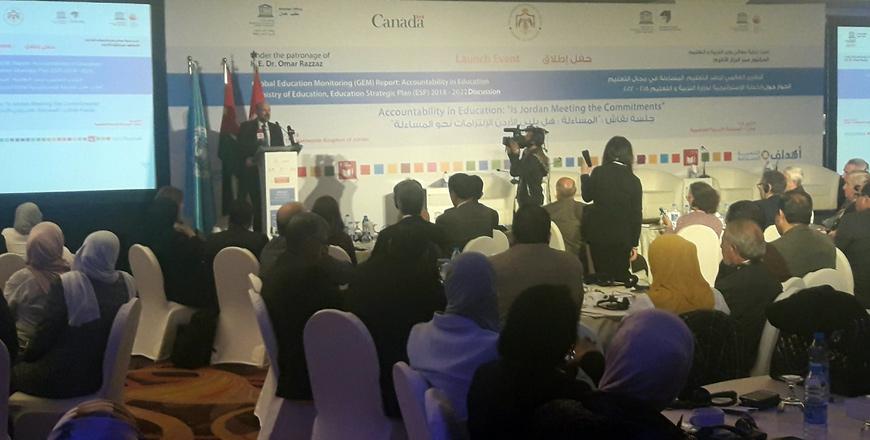You are here
Education institutions, UNESCO partners to ensure 2030 agenda implementation
Sep 21,2017 - Last updated at Sep 21,2017

Key education stakeholders and UN partners participate in a workshop on the Sustainable Development Goals in Amman (Photo courtesy of UNESCO)
AMMAN (UNESCO) — Key education stakeholders and UN partners have participated in a workshop in Amman focused on understanding and unpacking Sustainable Development Goal (SDG) 4 of the 2030 Sustainable Development Agenda.
In collaboration with the National Centre for Human Resources Development (NCHRD), these efforts are aligned with the National Human Resource Development Strategy (HRD Strategy) and the Ministry of Education’s “Education Strategic Plan” (ESP) 2018-2022, currently under development with technical support from the UNESCO Amman office.
Focusing on the SDGs, the workshop sought to enhance participants’ understanding while setting national targets integral to the HRD Strategy and ESP.
The education stakeholders in Jordan are striving to ensure that Jordan’s education system is working towards the improvement of quality education, so that learners at all levels are better prepared for employment and equipped with knowledge, life skills, attitudes and values that encourage prosperity.
Participants from the ministry, along with personnel from UNESCO, UNICEF, UNHCR and UNRWA participated in the capacity development workshop, which focused specifically on mainstreaming SDG 4 into the national plan and working towards Jordan’s roadmap for achieving SDG 4 by 2030.
This roadmap will be presented in October 2017 at the Regional Meeting on SDG 4 that is scheduled to take place in Tunis.
Goal 4 works to “ensure inclusive and equitable quality education and promote lifelong learning opportunities for all”.
Abdullah Ababneh, President of the NCHRD thanked UNESCO for its support and all attendees for their commitment to collaboration.
At the event, Mohammed Al Akor, secretary general of the Ministry of Education, said: “The realisation of SDG 4 will produce a society that will be able to face the challenges of this generation.” He encouraged participants’ active engagement, “striving to clarify each of your roles in achieving a concise roadmap to deliver on SDG 4”.
Yayoi Segi-Vltchek of the UNESCO Regional office based in Beirut applauded the strong collaboration and highlighted UNESCO’s interest in “accompanying Jordan along the journey towards the achievement of the 2030 Agenda”.
The 2030 Agenda and each individual goal were summarised by Ziad Obeidat, secretary general of the Ministry of Planning and International Cooperation, who emphasised the interconnectedness of the goals and highlighted Jordan’s successful preparation and submission of the Voluntary National Review report, presented at the UN High Level Political Forum in July.
Sessions delivered by UNESCO experts familiarised participants with the thematic indicators and UNESCO’s Institute of Statistics mapping and monitoring of the Agenda.
At the end of the workshop, participants discussed the way forward with groups completing the templates outlining the seven targets pertaining to SDG 4 and presenting the indicators customised to the Jordanian context.
Within its mandate, UNESCO regional office will continue to support the process and evaluate the indicators regionally as well as specifically in Jordan once finalised, while the UNESCO Amman office will assist the process by providing qualified technical expertise for the “Educational Strategic Plan”.
Related Articles
AMMAN — Personnel at the Ministry of Education (MoE) on Sunday began undertaking a technical training on monitoring, evaluation and reportin
AMMAN — The Ministry of Education (MoE) in collaboration with the UNESCO Amman office on Tuesday launched the Education Strategic Plan (ESP)
AMMAN — Kafa Akroush is head of the Gender Unit at Jordan’s Ministry of Education (MoE).














